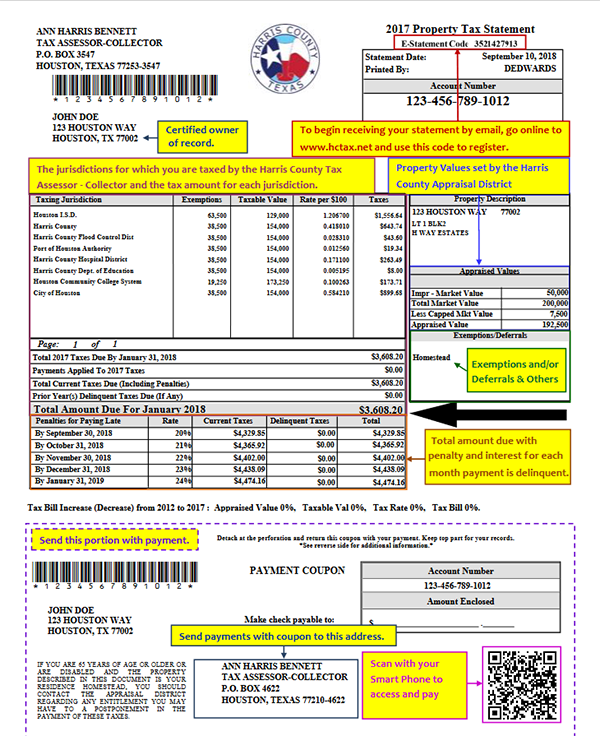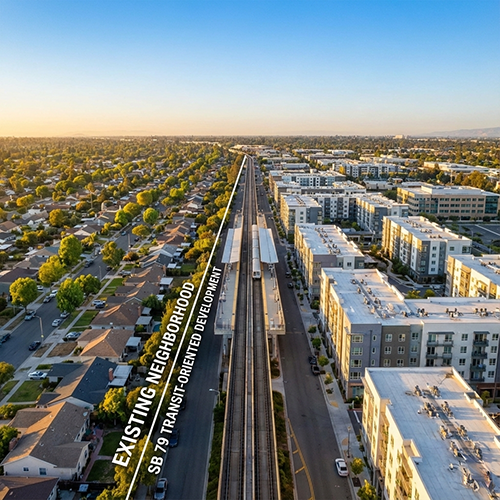Harris County Property Tax Protest Guide for Homeowners
This guide walks you through everything you need to know about protesting property taxes in Harris County—from understanding how the appraisal district works to filing your protest and preparing for your hearing.

Key Takeaways:
Key Harris Country Property Tax Highlights:
- Property Tax Rate: ~1.6% (varies by area - check yours)
- Median Home Value: $$329,377 (Source: Rocket)
- Protest Deadline: May 15 or 30 days after notice
- Protest Success Rate: 74%
- Average Protest Reduction: 11%
- CAD Resources: Harris CAD Website | iFile Protest Link
Your Harris County property tax bill probably went up again this year.
Not because your home improved. Not because the market surged. But because HCAD overvalued your property—and they're betting you won't fight back.
Here's the good news: 81% of informal protests succeeded in 2021. That's not a typo. 8 out of 10 homeowners who challenge their appraisal walk away with a lower tax bill.
The average win? An 11% reduction in taxable value. On a $350,000 home, that's $600+ back in your pocket every year.
This guide shows you exactly how to protest your Harris County property taxes—from filing your appeal to preparing evidence that wins at your hearing. No lawyers required. No confusing jargon. Just a clear process that gives you a real shot at cutting your tax bill.
Let's get into it.
How Appraisals Impact Your Taxes
Each taxing entity within Harris County—including the county, City of Houston, Houston ISD, and various special districts—sets its own property tax rate. The combined total forms the effective tax rate, which averages around 1.57% of a property’s market value for Houston homeowners.
If HCAD overestimates your home’s market value, your property tax bill increases even if rates remain constant. By protesting your appraised value, you can reduce the taxable base on which those rates are applied, often leading to substantial savings.
The Harris Central Appraisal District (HCAD) is responsible for appraising more than 1.8 million parcels of property across Houston and surrounding areas. HCAD estimates each property’s market value as of January 1 every year. This value forms the foundation for your property tax bill, which is calculated as:
Appraised Value × Tax Rate − Exemptions = Property Taxes Owed
For example:
- If your home is appraised at $350,000 and your combined tax rate is 1.6%, you'll pay approximately $5,600 annually in property taxes.
- If HCAD increases your appraisal to $385,000 (a 10% increase), your taxes jump to $6,160—an additional $560 per year.
Your appraised value should reflect what your home would reasonably sell for in the open market. However, because HCAD relies on mass appraisal techniques, these valuations can be inaccurate or inconsistent—especially for older homes, unique properties, or areas experiencing rapid changes in market demand.
HCAD sends notice of appraised values to property owners, typically in April or May. (See sample below for reference)

You can also look up your property appraisal on HCAD.org and view appraisal values from prior years to see if your property's value has increased.
Property owners then have the opportunity to protest those values if they believe them to be incorrect or unfair.
Recent Harris CAD Changes & Trends
In the past decade, property assessments in Harris County have increased at a much faster pace than population growth or inflation. Between 2014 and 2022, the total appraised value of property in the county rose approximately 77.7%, while the population grew by less than 10%.
This disproportionate increase has placed a growing financial burden on homeowners, making property tax protests an increasingly common and important tool for controlling costs.

In 2024, the average Harris County residential property saw a 2.6% rise in assessed value, despite only modest changes in market conditions. These trends suggest that regular protests are often necessary to maintain fair valuations.
Property Tax Protest Success Rates:
Harris County property owners have strong odds of success when protesting.
- 74% of property tax appeals submitted to the Appraisal Review Board
- 89% of informal protests were successful
- HCAD settles more than 500,000 protests annually
How Harris CAD Appraisals Impact Your Property Taxes
Each taxing entity within Harris County—including the county, City of Houston, Houston ISD, and various special districts—sets its own property tax rate. The combined total forms the effective tax rate, which averages around 1.6% of a property’s market value for Houston homeowners, and slightly more or less for other Harris County cities and school districts.
If HCAD overestimates your home’s market value, your property tax bill increases even if rates remain constant. By protesting your appraised value, you can reduce the taxable base on which those rates are applied, often leading to substantial savings.
Common Harris County Property Tax Exemptions
Exemptions lower the taxable value of your property, reducing your final bill. Harris County homeowners may qualify for several key exemptions:
- Residence Homestead Exemption: Reduces taxable value by $100,000 for school taxes.
- Over-65 or Disabled Exemption: Freezes school district taxes at current levels.
- Veteran Exemption: Available based on service-connected disability rating.
- Appraisal Cap (10%): Limits the annual increase in assessed value for homesteaded properties.
You can apply for exemptions online through HCAD’s website, and it is recommended to review your exemptions annually. Harris County's residential homestead exemption forms are due between January 1 and April 30. Late applications are accepted up to two years after the original deadline.
How to File a Harris County Property Tax Protest
If you believe your property has been overvalued, you can file a protest with HCAD to request a reassessment. The protest process is designed to ensure fairness, though it requires preparation and documentation to be effective.
- Review Your Notice of Appraised Value: Each April, HCAD mails notices showing your property’s new appraised value. Review this for accuracy, checking details like square footage, lot size, and property type.
- File Your Protest Online: Protests can be submitted through HCAD’s iFile system. The deadline to file is May 15 or 30 days after your notice is mailed, whichever is later.
- Select the Grounds for ProtestThe two most common bases for protest are:
- Market Value: The appraised value exceeds current market data.
- Unequal Appraisal: Similar nearby properties are valued lower by HCAD.
- Prepare Your Evidence: Gather recent comparable sales, photos of property defects, or repair estimates. You can also reference appraisal district data showing inequities between your property and similar homes.
- Attend the Informal Hearing: You’ll meet with an HCAD appraiser to review your evidence and attempt to reach an agreement. Many cases are resolved at this stage.
- Formal ARB Hearing (If Needed): If no agreement is reached, you’ll present your case before the Appraisal Review Board (ARB), a panel of independent citizens appointed to hear protests.
- Receive Your Result: The ARB will issue a written determination. If you still disagree, you may appeal through binding arbitration or district court.
Tips for Building a Strong Protest
- Use comparable sales within your neighborhood that are close in size, age, and condition.
- Provide photographs of any physical issues such as roof damage, foundation cracks, or deferred maintenance.
- Obtain contractor estimates for major repairs.
- Review neighboring assessments for similar properties to support an unequal appraisal argument.
- Be concise and professional in your presentation—ARB panels respond best to factual, well-documented cases.
Costs, Timelines, and Expected Savings
- Cost to File: Free to file when submitted directly to HCAD through iFile. Use a standard Texas intent to protest notice form 50-132 PDF.
- Typical Duration: Most protests are resolved between May and August.
- Average Savings: In 2024, successful protests resulted in an average 11.03% reduction in taxable market value.
- If You Hire a Consultant: Most charge 25–50% of your tax savings, only if your value is reduced.
Even small reductions can result in meaningful long-term savings because Texas property taxes are assessed annually on cumulative value increases. Savings for owners without the homestead and other exemptions, especially real estate investors and landlords, have the most to gain from protesting assessments for a reduction.
Important Reminders
- Be sure to attend your scheduled hearing—HCAD is reluctant to reschedule without sufficient cause.
- There's no penalty for filing, even if unsuccessful, and you can withdraw your protest at any point.
- If you hire a protest consultant, you only pay if you receive a reduction.
Conclusion
Filing a Harris County tax protest is your legal right and can result in substantial savings, particularly in a market where appraisals have been climbing steadily. With 78% of formal protests for single-family homes resulting in reductions in 2023, the odds are in your favor if you prepare properly.
The key to success is meeting the May 15 deadline, gathering strong comparable sales or unequal appraisal evidence, and presenting your case clearly and objectively. Whether you handle the protest yourself or work with a professional, taking action is the first step toward fair property taxation.
Don't leave money on the table—review your Harris County appraisal notice carefully when it arrives, and file your protest if your value seems too high compared to actual market conditions or neighboring properties.
The TaxDrop Advantage
TaxDrop automates the property tax protest process using verified market data and well-researched comparable reports. With TaxDrop, you can file your Harris County protest online in minutes, access professional-quality evidence, and only pay if your protest results in tax savings.
Paying Too Much in Property Taxes?
Let our licensed property tax experts assess your tax bill for potential savings. Over 80% of protests get a reduction of more than $1,000 and it takes less than 3 minutes to enroll.
⏰
🏠
💵
FAQs
When is the deadline to protest my Harris County property taxes?
The deadline is May 15 or 30 days from the date the appraisal district delivers the notice, whichever date is later. Note that the 30 days are calculated from when HCAD mails the notice, not when you receive it.
How much does it cost to protest my Harris County property taxes?
Filing a protest is free. If you hire a property tax consultant, they typically charge 25-50% of your first year's tax savings, and only if they successfully reduce your appraisal. Professional appraisals for evidence cost $300-$600 on average.
Can I protest my property taxes every year?
Yes. For best results, protest annually. Each tax year is independent, and you have the right to protest your appraisal value every year if you believe it's incorrect.
What are my chances of winning a Harris County tax protest?
Your odds are good with proper preparation. In Harris County, 74% of appeals submitted to the Appraisal Review Board and 89% of informal protests were successful. Success depends on having strong evidence supporting your position.
What is the Harris County homestead exemption worth?
The school district homestead exemption is worth at least $40,000 (See Property Tax Exemptions for Homeowners), and Harris County provides a 20% optional homestead exemption, reducing a $100,000 home's taxable value to $80,000. Combined, these exemptions can save homeowners hundreds to thousands of dollars annually.
How do I check my Harris County property tax bill online?
Visit the Harris County property tax database and search by your property account number, address, or owner name. You can view your current and past tax bills, payment history, and appraisal information.
When are Harris County property taxes due?
Property tax bills are generally mailed in October or November for the current year, and taxes are paid in arrears. Taxes are due upon receipt in October and become delinquent if not paid before February 1.
Can I protest if my property value went down, but my taxes went up?
Yes. Your taxes can increase even if your property value decreases if tax rates increase. You can protest your appraised value regardless of whether it increased or decreased from the prior year—what matters is whether the current appraisal is accurate.
What's the difference between appraised value and market value in Harris County?
Homeowners can technically protest only the market value of their property, not the appraised value, as the appraised value for homesteads is a statutory formula dictated by the Texas Constitution (What to expect when you file a property tax protest in Harris County). The appraised value (what you're taxed on) can only increase by 10% annually for homesteaded properties, even if the market value increases more.
Do I need a lawyer to protest my Harris County property taxes?
No. You may appoint someone to represent you by filing Form 50-162, but property owners are not required to use the notice of protest form—any written indication of dissatisfaction is sufficient. Most successful protests are handled by property owners themselves or by property tax consultants, not attorneys.
Ryder Meehan
Ryder Meehan is the Co-Founder of TaxDrop and a Licensed Property Tax Protest Consultant


